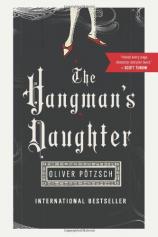Reading Group Guide
Discussion Questions
The Hangman's Daughter

1. Why do the orphans refuse to tell the townspeople what they witnessed? How does this mistrust shape their fate? Do you think they made the right choice?
2. What do you think of Sophie and her actions?
3. The man referred to as “the devil” compares himself to Jacob Kuisl: “You’re like myself…Killing, that’s our business…we’re…more alike than you’d think” (p. 379). Explain why you agree or disagree with this. Discuss the similarities and differences between the two.
4. How does the town of Schongau function as a character in the story?
5. Many of the book’s central characters are real historical figures. Does knowing this affect the way you read the novel?
6. Were you surprised to discover the identity of “Moneybags?” Who had you suspected? Do you think justice was served?
7. Why do you think Oliver Pötzsch chose the title The Hangman’s Daughter?
8. Jakob Kuisl’s “holy of holies” is a “small study filled to the ceiling with dusty files and old books about what an executioner is and does” (p. 433). What would your holy of holies contain?
9. At twelve Jakob Kuisl vows: “Never would he follow in his father’s footsteps; never in his life would he become a hangman” (p. 12). Discuss what you think happens later in life to change his mind.
10. Jakob Kuisl is described as “An angel with a huge sword. An avenging angel” (p. 163). Discuss why the hangman is both respected and feared? Do you think that regardless of his profession, he is an honorable man?
11. How do you think the Schongau witch trials differ from the more familiar Salem witch trials?
12. “Jakob Kuisl, too, knew all about potions and was suspected of sorcery. But he was a man. And he was the executioner” (p. 48). Why are these important distinctions? Both Jakob and Martha are viewed as outsiders in their community, but discuss some of the differences between the executioner and the midwife.
13. “If you want to know who is responsible for anything, ask who benefits from it” (p. 127). Did Johann Lechner’s handling of events hinder or help the investigation? Why does he think the Landgrave should be convinced the witch controversy has been contained? Do you think his actions are based solely on greed or for the welfare of Schongau?
14. Is holding one person responsible, whether guilty or not, justified if it saves a community? Where else have you seen a situation like this?
The Hangman's Daughter
- Publication Date: August 2, 2011
- Genres: Fiction, Historical Fiction
- Paperback: 448 pages
- Publisher: Mariner Books
- ISBN-10: 054774501X
- ISBN-13: 9780547745015








